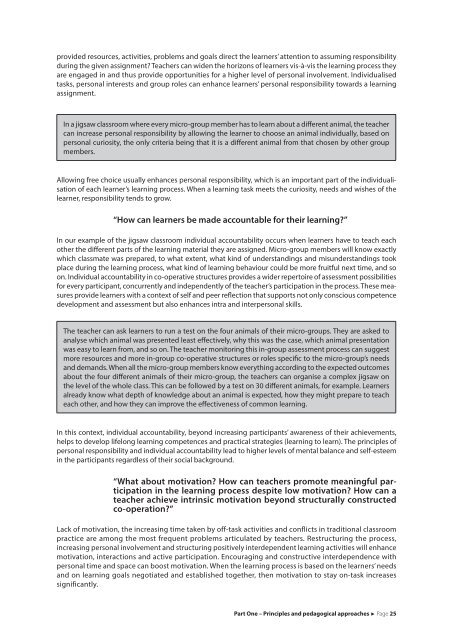TASKs for democracy
4NYw4W
4NYw4W
Create successful ePaper yourself
Turn your PDF publications into a flip-book with our unique Google optimized e-Paper software.
provided resources, activities, problems and goals direct the learners’ attention to assuming responsibility<br />
during the given assignment? Teachers can widen the horizons of learners vis-à-vis the learning process they<br />
are engaged in and thus provide opportunities <strong>for</strong> a higher level of personal involvement. Individualised<br />
tasks, personal interests and group roles can enhance learners’ personal responsibility towards a learning<br />
assignment.<br />
In a jigsaw classroom where every micro-group member has to learn about a different animal, the teacher<br />
can increase personal responsibility by allowing the learner to choose an animal individually, based on<br />
personal curiosity, the only criteria being that it is a different animal from that chosen by other group<br />
members.<br />
Allowing free choice usually enhances personal responsibility, which is an important part of the individualisation<br />
of each learner’s learning process. When a learning task meets the curiosity, needs and wishes of the<br />
learner, responsibility tends to grow.<br />
“How can learners be made accountable <strong>for</strong> their learning?”<br />
In our example of the jigsaw classroom individual accountability occurs when learners have to teach each<br />
other the different parts of the learning material they are assigned. Micro-group members will know exactly<br />
which classmate was prepared, to what extent, what kind of understandings and misunderstandings took<br />
place during the learning process, what kind of learning behaviour could be more fruitful next time, and so<br />
on. Individual accountability in co-operative structures provides a wider repertoire of assessment possibilities<br />
<strong>for</strong> every participant, concurrently and independently of the teacher’s participation in the process. These measures<br />
provide learners with a context of self and peer reflection that supports not only conscious competence<br />
development and assessment but also enhances intra and interpersonal skills.<br />
The teacher can ask learners to run a test on the four animals of their micro-groups. They are asked to<br />
analyse which animal was presented least effectively, why this was the case, which animal presentation<br />
was easy to learn from, and so on. The teacher monitoring this in-group assessment process can suggest<br />
more resources and more in-group co-operative structures or roles specific to the micro-group’s needs<br />
and demands. When all the micro-group members know everything according to the expected outcomes<br />
about the four different animals of their micro-group, the teachers can organise a complex jigsaw on<br />
the level of the whole class. This can be followed by a test on 30 different animals, <strong>for</strong> example. Learners<br />
already know what depth of knowledge about an animal is expected, how they might prepare to teach<br />
each other, and how they can improve the effectiveness of common learning.<br />
In this context, individual accountability, beyond increasing participants’ awareness of their achievements,<br />
helps to develop lifelong learning competences and practical strategies (learning to learn). The principles of<br />
personal responsibility and individual accountability lead to higher levels of mental balance and self-esteem<br />
in the participants regardless of their social background.<br />
“What about motivation? How can teachers promote meaningful participation<br />
in the learning process despite low motivation? How can a<br />
teacher achieve intrinsic motivation beyond structurally constructed<br />
co-operation?”<br />
Lack of motivation, the increasing time taken by off-task activities and conflicts in traditional classroom<br />
practice are among the most frequent problems articulated by teachers. Restructuring the process,<br />
increasing personal involvement and structuring positively interdependent learning activities will enhance<br />
motivation, interactions and active participation. Encouraging and constructive interdependence with<br />
personal time and space can boost motivation. When the learning process is based on the learners’ needs<br />
and on learning goals negotiated and established together, then motivation to stay on-task increases<br />
significantly.<br />
Part One – Principles and pedagogical approaches Page 25


